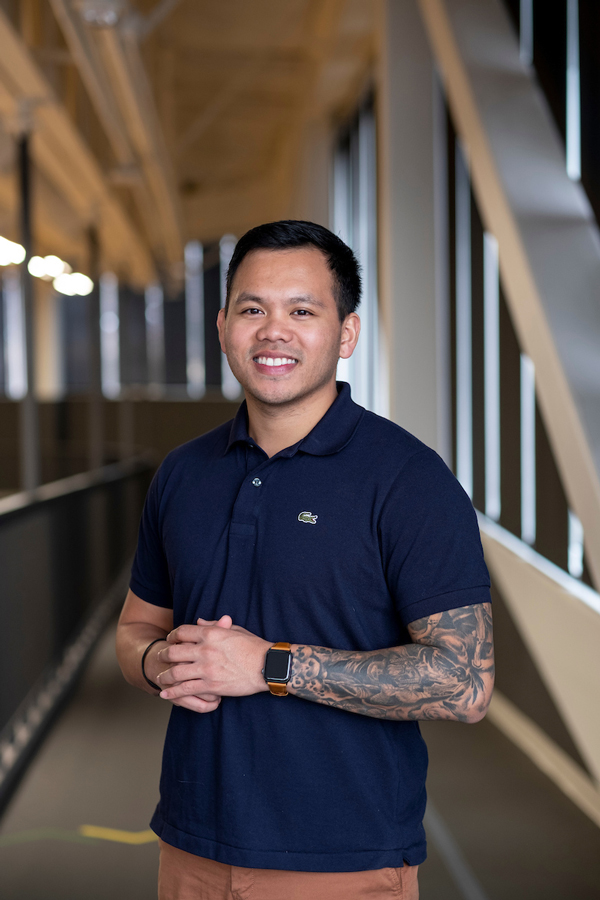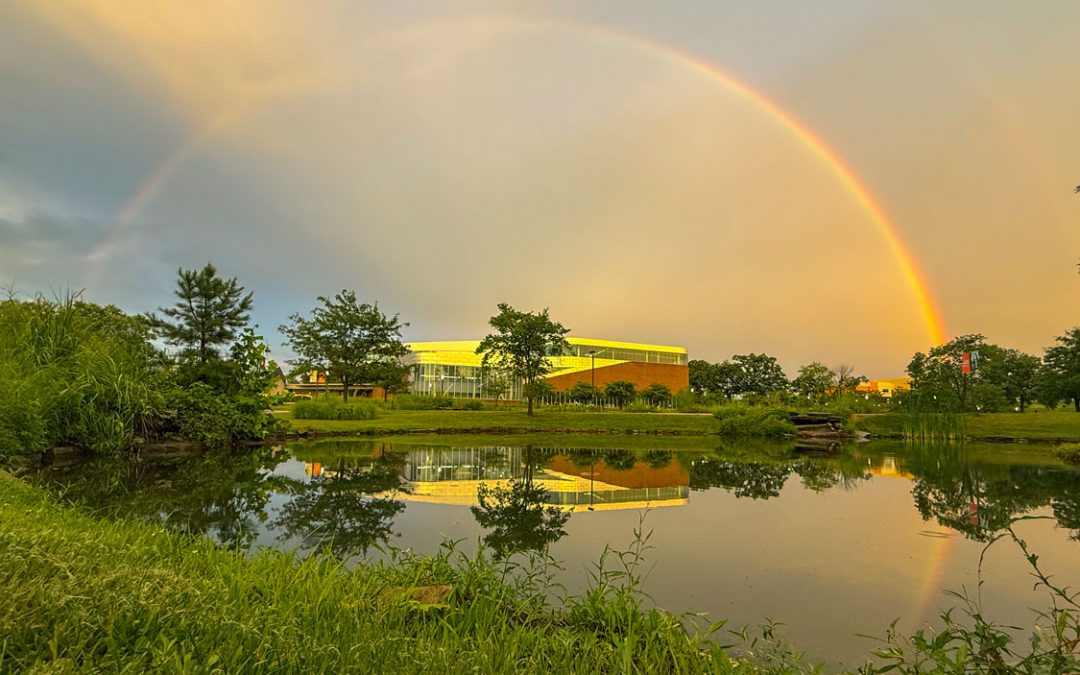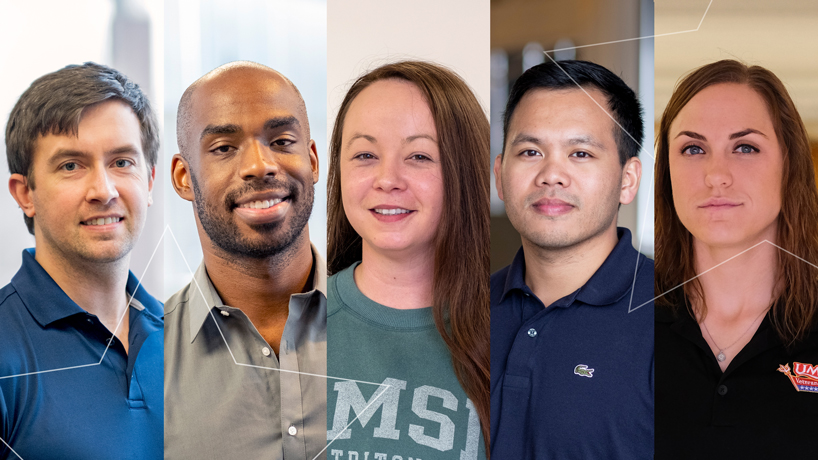
Military veterans (from left) Patrick Murrell, Jarrett Hickman, Margaret Rheinecker, Paul Nator and Tori Tappe all came to UMSL looking to formulate their future career plans after leaving active duty. (Collage by Joan Barnidge, photos by August Jennewein)
Veterans who gain the most attention in the United States typically fall into one of two categories.
There are the ones celebrated for the heroism they displayed while battling in war zones and the others who’ve returned broken from those same locales, battling conditions such as post-traumatic stress disorder and struggling to readjust to civilian life.
But most former soldiers, sailors, Marines and airmen exist unnoticed somewhere in the wide space between.
“There’s this whole group of stealth veterans,” says Joshua Perschbacher, director of the Veterans Center at the University of Missouri–St. Louis. “They probably sit in the same pew at church next to you. They’re at the baseball games. And unless they are invited to stand up on 9/11 or Veterans Day, you might never know that person is a vet.”
Currently, more than 400 student veterans have found a home on the UMSL campus. They blend right into the rest of the student population as they work to earn their degrees and brighten their futures. Here are a few of their stories.
Paul Nator, former Green Beret, civil engineering major
Paul Nator was attending Ranken Technical College and working construction jobs on the side back in 2010, but he couldn’t escape this persistent feeling he could be doing something bigger.
He enlisted in the United States Army and eventually earned his way into special forces, spending five years as a Green Beret. He served five deployments, including two in Iraq and three in Southeast Asia.
Nator was first deployed to Iraq as Operation Iraqi Freedom gave way to Operation New Dawn, but he returned years later as fighting flared up again. His experiences overseas shaped him.
“You go through these hardships and successes with people that are like you and understand you to coming back here, and it’s just not the same I guess,” Nator says. “It wasn’t easy to leave behind.”
Nator knew he had to find something to challenge himself as he transitioned out of military service. He thought the UMSL/WUSTL Joint Undergraduate Engineering Program could do just that.
He still had a difficult time leaving behind the camaraderie of his unit.
“It’s cliché, but we fight for one another,” he says. “I spent two years in the infantry and five years in special forces, and even more so on a special forces team, you know every single one of their wives and kids. It’s a big family.”
After discharging in 2017, he remained wary of returning to school and uncertain how he’d fit in after so much time away.
“I know at first I was very standoffish in thinking I might be too old for this,” Nator says. “The commuter population and the veteran population made it easier than I originally thought.”
Nator hasn’t only been working toward his degree in civil engineering. He’s also been studying entrepreneurship and spent four months last year interning with startup Jrop through the Ameren Accelerator program.
Just being in that environment and interacting with other interns inspired Nator to explore launching his own business.
He’s brought his military expertise to Green Hat Shooting Solutions, which opened last May and provides firearms training. He also took part in the inaugural Entrepreneur Quest Student Accelerator as he grows the venture.
“As a business, we’re really getting a lot of momentum,” Nator says, “and having conversations with different military units that want to hire us on as contractors.”
Margaret Rheinecker, Air Force veteran, nursing major
Margaret Rheinecker spent seven years as an aerospace medical technician in the U.S. Air Force.
“That’s a very long way of saying medic,” says Rheinecker, who was stationed most of that time at Nellis Air Force Base near Las Vegas.
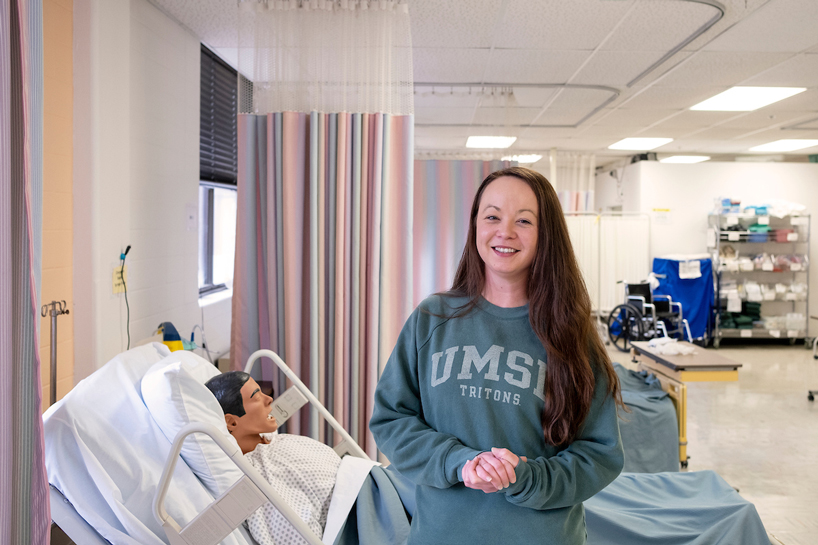
Margaret Rheinecker’s experience as an aerospace medical technician in the Air Force made her want to pursue a degree in nursing.
The experiences she had working in the flight medicine clinic there and during three deployments – one to Kyrgyzstan and two to Qatar – gave her an up-close look at health care and ultimately steered her toward her intended career in nursing.
“I like interacting with patients and the ability to potentially help somebody – whether it’s just a minor scrape or abrasion or they’re on their deathbeds,” Rheinecker says. “It’s really rewarding.”
She started making plans to study nursing and had settled on UMSL after researching the BSN program and the Veterans Center even before she separated in July 2017.
Rheinecker started classes a month later and has been making steady progress toward her degree. The Dupo, Illinois, native had already had a year of college coursework at the University of Missouri–Columbia before her enlistment, and she’s now on track to graduate in 2020.
Ultimately, Rheinecker would like to end up working with trauma patients, either in an emergency room or trauma intensive care unit.
“I want to do something a little fast paced and a little bit more hands on,” she says. “When I did my rotations at the trauma center, I felt like I was able to help more. You could see anything from folks who were sick to somebody who broke a bone to a full trauma code.”
Rheinecker has maintained her military connections since she started school, serving one weekend a month and training two weeks a year in the Illinois Air National Guard. She hasn’t ruled out re-enlisting after graduation.
“I have not made that decision yet,” Rheinecker says. “I’ve just wanted to focus more on school. You always have the ability to go back to active duty. I’ve been kind of eyeballing it, but I’ll just have to see where it goes in two years.”
Jarrett Hickman, Marine Corps veteran, psychology major
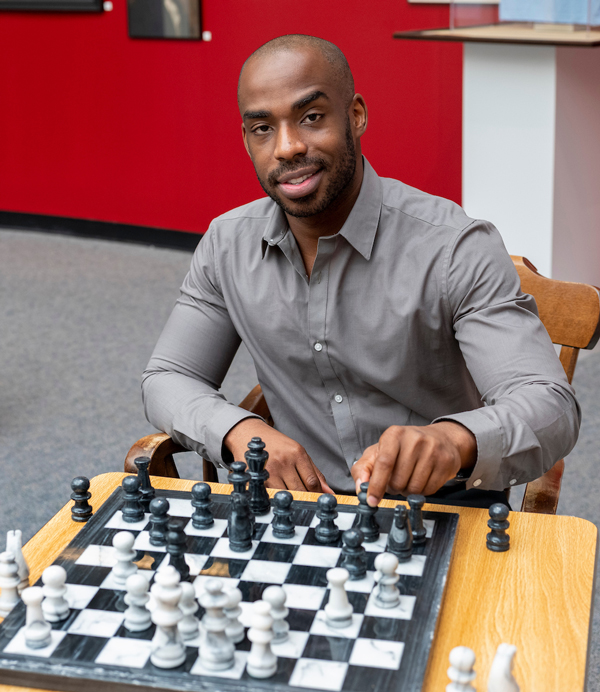
Jarrett Hickman had planned on a career as a police officer when he joined the Marine Corps, but he changed plans after injuring his back and now aims to become a clinical psychologist.
Jarrett Hickman had been enjoying his time in the military, especially the stretch in which he was stationed overseas in Okinawa, Japan.
“That place was like a vacation,” he says. “I would love to retire there.”
He also thought he was getting ideal training for the type of job he wanted post-service by working as a military police officer in the Marine Corps. But a freak back injury suffered while lifting weights during his stay at Camp Lejeune in North Carolina threw his future in criminal justice into disarray.
“I couldn’t sit in a patrol car longer than two or three hours, and it limited my ability to run,” he says.
Doctors didn’t recommend surgery but instead gave him spinal injections, and Hickman began working with a chiropractor while starting to reconsider his future.
The native of Alton, Illinois, long had an interest in psychology, so he decided to pursue that upon separating from the corps after five years. He started at Lewis and Clark Community College and then transferred to UMSL at the urging of one of his instructors.
His first semester back in school was rough as he attempted to work full time and maintain a full course load with a child at home. He’s since dropped his job to focus solely on studying while his family has grown. He and his wife, Britney, now have three children, ages 1, 3 and 5.
Hickman’s on track to graduate this spring and has been applying to graduate programs. He wants to be a clinical psychologist, and he recognizes it’s a career that could help him serve other veterans.
“Right now, I’m studying PTSD in the lab, and I did that because, like most veterans, I’ve had people that I know who’ve committed suicide after getting out or right before they got out,” he says. “If I could learn skills to help people go through that transitioning process, I’d really like that.”
It’s not the only group he’s interested in serving. He’s also honing his Spanish skills so he can work as a bilingual counselor because he sees a need among the growing Hispanic immigrant population.
Tori Tappe, Marine Corps veteran, social work major
Tori Tappe feels called to support other veterans. It’s the whole reason she’s at UMSL pursuing her bachelor’s degree – and then maybe a master’s – in social work.
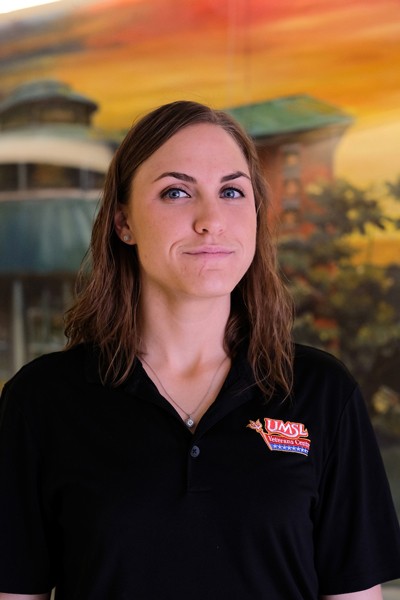
Tori Tappe’s experience assisting junior Marines as a work center supervisor in the Marine Corps prompted her to pursue a degree in social work.
Tappe, who transferred from junior college in Kentucky last fall, isn’t certain yet if she wants to work at a Veterans Affairs hospital or another nonprofit catering to former troops. In fact, she hasn’t ruled out the idea of re-enlisting in the Marine Corps and working inside the military structure.
But she knows she wants to help.
Being a support to her fellow Marines remains the thing she loved most about her time in service, which included working as an airframe mechanic on EA-6B Prowlers and ultimately serving as a work center supervisor. She assisted junior Marines, connecting them with resources and helping them through difficult times.
Tappe also can’t forget the impact a military and family licensed counselor had in the wake of her 16-year-old brother Hank’s suicide, not long after she returned from her first deployment to Japan in 2013.
“I talked to (the counselor), and I knew that was what I wanted to do,” Tappe says. “I’ve been through some stuff. I knew I wanted to be there for people who needed help. He was there for me at my darkest time.”
Tappe, who grew up in Union, Missouri, and enlisted in the Marines within weeks of her high school graduation in 2011, feels an incredible kinship with fellow veterans.
She fought some depression when she first returned to civilian life in 2016 and again last summer when she was moving back to Missouri and waiting to begin classes at UMSL.
But school has kept her active and upbeat, and she finds fulfillment volunteering at the Veterans Center.
“Staying busy is my thing, and it keeps me focused,” Tappe says. “Sometimes I miss it, and until I started working at the Veterans Center, I felt off. But those are my people, and I fit in so well. It’s fun. I love talking to different people, hearing their stories and just telling my story to them.”
Patrick Murrell, Marine Corps veteran, business alumnus

Patrick Murrell earned his degree in business administration after leaving the Marine Corps and began a job at TD Ameritrade after graduating in December.
December proved to be a whirlwind for Patrick Murrell, who wrapped up his BSBA with dual emphases in finance and international business and rolled almost immediately into a new job at TD Ameritrade.
The first couple months there weren’t exactly calm either, as he tried to prepare for the Series 7 and Series 63 exams he needed to pass to become a licensed stockbroker.
With those challenges behind him, he’s started settling into his position in financial services, speaking to clients and guiding them on potential trades.
It’s the type of work Murrell imagined himself doing when he decided to go back to school as he was leaving the Marine Corps infantry in 2015.
“I really wanted to get into finance specifically as a part of business,” Murrell says. “I liked the numbers game of it. There was something about it that just seemed interesting that you could make money with money. It fascinated me.”
He’d done some investigating and decided even before his service time ended that UMSL was the right school to help him get there. It was close enough to where he grew up in west St. Louis County, provided an accredited program and didn’t require him to stretch the benefits he had available through the GI Bill after serving for 4½ years, including a deployment to Asia with the 31st Marine Expeditionary Unit.
Murrell had been studying criminal justice at Southeast Missouri State University when he decided to enlist in 2011. UMSL made it easy for him to transfer his existing credits.
He points to Lead Undergraduate Business Advisor Monica Farrell and staff members in the Veterans Center for showing him the most efficient path to his degree while even building in time to study Arabic.
“Everything was pretty user friendly, especially with the amount of hands-on attention you get with advisors that would help you with your schedule,” Murrell says. “For the amount of value you get, UMSL was a really great school for business.”
This story was originally published in the spring 2019 issue of UMSL Magazine. If you have a story idea for UMSL Magazine, email magazine@umsl.edu.

